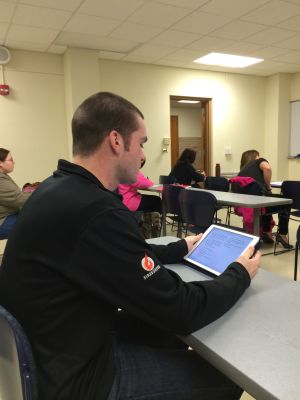Tablets vs. printed paper: What’s your choice?
February 19, 2014
“I take my laptop, three to five textbooks and a separate bag with personal stuff with me to class,” said Lucy Hesse, a law school graduate. “Usually I take notes on my laptop, but there is one class where laptops are not allowed, so I’ll take pen and paper.”
Carrying two or three textbooks with 600 pages each is a common scene for college students.
However, for Nick Chim, junior criminal justice major, it’s easier for him to use e-books for classes.
“I just bring my laptop pack to class, and I have my folders with notes, pens and laptop in it. Mostly I use a notebook to write down the notes and then type it later,” said Chim. “I will use e-books if possible. It’s more convenient to only have a laptop. And print books are more expensive usually. Technology is booming.”
Though e-books can take a whole lot of weight off students’ shoulders with tablets only taking up a few square inches in their bag, but there are still quite a few fans of printed books.
“I prefer textbooks because you don’t get the same feeling from reading through a tablet as through a book,” said Hesse. “It’s more beneficial for us to interact with the text rather than use the e-books.”
According to Bradley Siebert, an assistant English professor, students do use tablets or laptops sometimes. Maybe two or three of his 80 students are using e-books a semester, but this semester not as many of them are using tablets as they did last semester. For those who use technology in class, Siebert expressed his understanding. However, he still holds concerns about it.
“With an e-book, it seems less likely that the students will study the book and mark it up, though a lot of students avoid writing in their books, underlining or highlighting things,” said Siebert. “I always like students to potentially interact with their books by marking them up and writing notes to themselves in the margins. Though e-books do allow for that, there are some steps involved that make it less convenient for students to do that.”
Brian C. Thomas, an associate physics and astronomy professor, also noticed students bringing laptops to his class.
“In my astronomy class I have an e-book option, so I know some of my students use that, but the majority still get the regular paper book. I think it is a good option to use e-books. For the students it’s a lot cheaper, and I use a homework system online, which is linked to the e-book. It is really useful,” said Thomas.
Though laptops are convenient they can also cause distractions in class. However, Thomas has his own way to handle it.
“In terms of using tablets or laptops in my class, I don’t have any problem with it. Some of them may be doing things that are not related to the class, but my philosophy is that if they are not disturbing the class, I don’t care what they do,” said Thomas.



